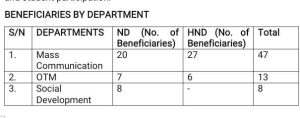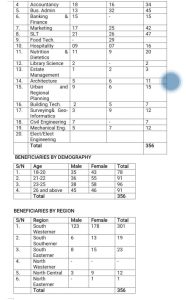Data Journalism is a branch of journalism that focuses on using data to uncover, explain, and present news stories. It involves converting complex data sets into meaningful narratives, often through the use of visualizations, infographics, and charts to help illustrate the findings.
The key aspects of data Journalism include:
i. Data Collection: Journalists gather data from various sources, such as government reports, public records, surveys, and online databases.
ii. Data Analysis: they analyse the data to discover patterns, trends, and insights that can inform news stories or shed light on important issues
iii. Visualization: data Journalists often create visual presentations of data, making it easier for audiences to understand complex information.
Iv. Storytelling: the ultimate goal is to communicate findings effectively through engaging narratives, helping to inform, educate and provoke thought among readers.
Data Journalism is increasingly important in today’s information-driven society, where data can reveal significant insights about social, political, and economic issues.
It is an emerging field that combines traditional journalism with data analysis, providing journalists with tools to interpret complex information and tell compelling stories backed by empirical evidence. This approach allows for the exploration of issues in greater depth and offers insights that can influence public discourse and policy.
MOSHOOD ABIOLA POLYTECHNIC (MAPOLY) HISTORICAL OVERVIEW
Moshood Abiola Polytechnic (MAPOLY), located in Abeokuta, Ogun State, Nigeria, is one of the leading Polytechnic in the country. It was established in 1979 as Ogun State Polytechnic under the administration of the then military government of Ogun State. The Institution was later renamed Moshood Abiola Polytechnic in 1999 in honour of Chief Moshood Kashimawo Olawale Abiola, a prominent Nigerian businessman and politician.
Today, Moshood Abiola Polytechnic remains a key player in Nigeria’s higher education system, emphasizing technical education and entrepreneurship to prepare students for the workforce.
NATIONAL EDUCATION LOAN FUND (NELFUND)
The Nigerian Education Loan Fund (NELFund) is a pivotal financial institution established to provide interest-free loans to Nigerian students pursuing higher education. Its creation marks a significant step towards enhancing educational accessibility in Nigeria.
It was launched in 2024 under President Bola Ahmed Tinubu’s administration, NELFund aims to remove financial barriers that have historically prevented many Nigerians from accessing tertiary education.
NELFund primary objective is to provide financial support to qualified Nigerian students for tuition and associated fees, thereby breaking financial barriers to higher education. (Wikipedia)
The Fund operates as a corporate body with authority to acquire and manage property, sue and be sued, and perform functions necessary for its mandate. It is governed by a board of directors comprising representatives from relevant ministries and agencies, ensuring comprehensive approach to educational financing.
To ensure the sustainability of the loan scheme, the Nigerian government allocated substantial resources to NELFund. Notably, in 2024, the Economic and Financial Crimes Commission announced that the sum of N50 billion, recovered from looted funds, was granted to NELFund, highlighting the government’s commitment to
education. (nationonlineng.net)
Since its inception, NELFund has disbursed significant amount to various institutions across Nigeria. For instance, by August 2024, approximately N2.9 billion had been distributed to 19 institutions, benefiting. this efforts underscore NELFund’s role in alleviating financial constraints for students over 27,000 students. (Wikipedia)
In February, 2025, NELFund disclosed that it had disbursed N22.7 billion as institutional loans, benefitting 215,514 students by the end of 2023/2024 academic session. the milestone reflects the Fund’s expanding reach and impact on Nigerian higher education (Wikipedia)
To this end, it is important to note that NELFund represents a significant advancement in Nigeria’s effort to make higher education accessible to all citizens. By providing interest-free loans and addressing past challenges in student loan schemes, NELFund aims to ensure that financial constraints no longer hinder educational aspirations of the citizens of the country.
DATA JOURNALISM ROLE IN ANALYZING NELFUND AT MAPOLY
At MAPOLY, Data Journalism plays a crucial role in evaluating the impact and effectiveness of NELFund programs. By collecting and analyzing data related to loan applications. disbursements and student demographics, the assessment of how well the program meets its objectives. For instance, in an appreciation message from the Management of Moshood Abiola Polytechnic to the NELFund office, Abuja, it was stated that the total population of the students that was granted the loan is about 356 students, out of the total population of 11,0000 students in 2023/2024 academic session, with the total sum amount disbursed is Forty-Seven Million, Thirty-Eight Thousand Naira (N47,038,000.00).
The following are the data driven insights that reveals a gap between available students and student participation:


CHALLENGES UNCOVERED THROUGH DATA ANALYSIS
The low application and qualification rates at MAPOLY as uncovered through data analysis, suggest several chhallenges as highlighted bellows::
I. Awareness and outreach: Despite the availability of funds, many students are unaware of the NELFund program or its application process.
ii. Application Process Barriers: the complexity or perceived difficulty of the application process might deter students from applying.
iii. Eligibility Criteria: strict and unclear eligibility requirements could limit the number of students who qualify for the loans.
iv. Delay in issuing matriculation numbers to the new intakes/applicants. i.e. (ND I students).
v. Intermittent Access to the Portal due to overcrowding.
Already verified applicants were not approved on time but continued to indicate ‘Pending’.
vi.Delay in the disbursement of fund to the approved students.
The Polytechnic Management in tackling the challenges, constituted a NELFund Committee. The Committee is saddled with responsibility of the NELFund advocacy within the campus with the following Terms of Reference (ToR):
i. To sensitize the students on the benefits and procedures for accessing the National Education Loan Fund (NELFund).
ii. To collaborate with relevant stakeholders to ensure effective dissemination of information.
iii. To provide adequate guidance required to the students on the need to explore the opportunity.
iv. To give adequate report to Academic Board on the Committee’s progress
THE COMMITT EE’S PROPOSED SOLUTION TO TACKLE THE CHALLENGES UNCOVERED
After a robust deliberation on the TOR, the following propositions were made:
1. Billboard for NELFund awareness:
i. That the 10” by 20” Bill Boards at the entrance of the Polytechnic and the one at the Mass Communication area should be used to advertise the scheme.
ii. That the printing of the flex banners for the two billboards is Two Hundred Thousand Naira Only (N200,000.00)
2. Flex banners for Schools:
i. A 7” by 8” Flex Banner should be placed in each of the five Schools in the Polytechnic.
ii. A copy of the Flex Banner was projected to cost Twenty-Five Thousand Naira (N25,000.00), therefore five copies will cost One Hundred and Twenty-Five Thousand Naira (N125,000.00)
3. Creation of NELFund Office in each School:
i. Each school should designate an Officer to handle NELFund matters.
ii. The meeting suggested deploying the National Identity Management Commission (NIMC) Officers and Bank agents to the Polytechnic to register students for National Identity Number (NIN) and open dedicated bank accounts for the students respectfully. This is to assist the applicants in avoiding the problems of mismatch of names which is a major contributor to difficulty in processing NELFund loans.
It is therefore recommended that a space should be provided for NIMC agents and Bank Officials to ease and attract the students to apply for the Loan.
3. Provision of I.T. Facilities
That laptops and internet facilities should be provided by the Polytechnic Management in each school to support seamless students’ application and registration.
4. Dedicated Account for NELFund:
The meeting appealed to Management to create a dedicated account for refunding students who paid school fees before receiving their loan. A clear position on this would encourage more enrolment.
5. Point At Which Matriculation Number is Allocated:
The Committee recommended that matriculation numbers be issued after clearance instead of after tuition payment, to facilitate smoother registration for the Loan.
CONCLUSION
The case of NELFund at Moshood Abiola Polytechnic exemplifies the power of data journalism in evaluating and enhancing educational programs. By leveraging data to uncover participation gaps and operational challenges, journalists provide valuable insights that can drive improvements in policy and practice, ultimately ensuring that financial aid initiatives fulfill their mission of making higher education accessible to all.
420 total views, 3 views today


